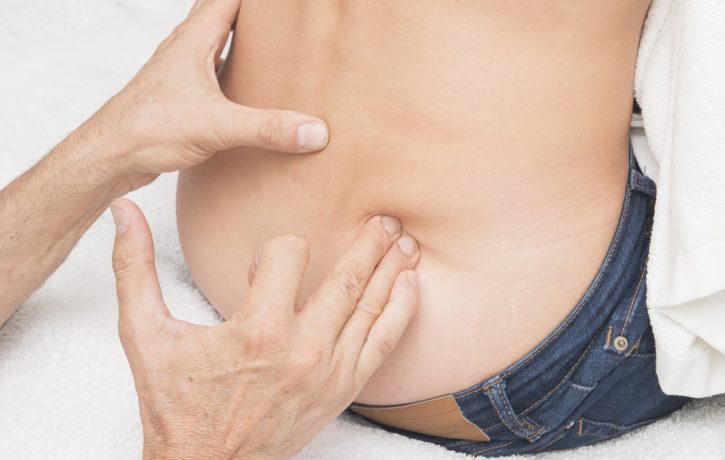in Osteopathy, Sports Physiotherapy
Hip and Gluteal Pain

Gluteus medius syndrome is one of the major causes of back pain and/or leg pain and is similar to greater trochanteric pain syndrome (GTPS). GTPS was historically referred to, or often misdiagnosed as trochanteric bursitis (if you or a family member has ever been diagnosed with trochanteric bursitis, it may have been greater trochanteric pain syndrome).
The term “gluteus medius syndrome (GMedS)” identifies the gluteus medius as the muscle most commonly associated with low back pain or leg pain when the source of pain is of a myofascial (an anatomical term to describe both muscle and connective tissue) origin. Known as myofascial pain syndrome (MPS), this is simply defined as pain attributable to trigger points in specific muscles. Gluteus medius syndrome, therefore, is myofascial pain syndrome arising from the gluteus medius muscle.
Gluteus medius syndrome is similar to a disease entity to greater trochanteric pain syndrome, either of which can present with symptoms of low back and/or leg pain. Gluteus medius syndrome can also be related to lumbar degenerative disease, hip osteoarthritis, knee osteoarthritis, and failed back surgery syndrome. This essentially means that those with any of the listed conditions, you may develop gluteus medius pain syndrome secondary to compensations made due to those specific conditions. Therefore, correct diagnosis of gluteus medius syndrome and appropriate treatment could possibly improve lumbar degenerative disease, osteoarthritis of the hip or knee and failed back surgery syndrome.
The prevalence of MPS within the context of persistent back pain is about 70–90% of sufferers, while the prevalence of myofascial trigger points in the gluteus medius muscle within the context of chronic low back pain is between one and two thirds (38% to 68%) of patients. GMedS is treated by specific exercise prescription to target the gluteus medius, manual trigger point therapy, and if no improvement is seen after that within 3 months, then by surgical decompression of the nerve to gluteus medius or the cluneal nerve.
If you have any of the symptoms discussed above and you want to have an assessment to determine best treatment and management, please do not hesitate to contact The Body Matters clinic to make an appointment with Matthew Oliver.
- Consult Your Body’s Inner Wisdom - 25th September 2025
- Unpacking Misconceptions About Deep Rest Meditation - 26th August 2025
- The Missing Piece in Wellness? Why Realization Process Offers More Than Mindfulness - 22nd July 2025
